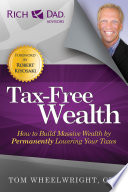

The tax code is a complex and often misunderstood set of regulations that govern how taxes are levied on individuals and businesses. In 'Tax-Free Wealth', Tom Wheelwright emphasizes the importance of understanding the tax code as a tool for wealth creation. He argues that the tax code is not merely a set of rules to be followed, but a roadmap for financial success. By understanding the incentives and deductions available within the tax code, individuals can significantly reduce their tax liabilities. This understanding allows individuals to make informed decisions about their financial strategies, investments, and business operations. Wheelwright explains that the tax code is designed to encourage certain behaviors, such as investing in real estate or starting a business, and that savvy taxpayers can leverage these incentives to build wealth over time.
Continue readingTax planning is a proactive approach to managing one's finances in a way that minimizes tax liabilities. Wheelwright discusses the necessity of tax planning as an integral part of wealth-building strategies. Unlike tax preparation, which is often a reactive process that occurs at the end of the tax year, tax planning is ongoing and requires a strategic mindset. By engaging in tax planning throughout the year, individuals can take advantage of deductions, credits, and other tax-saving opportunities. Wheelwright provides practical tips and frameworks for effective tax planning, emphasizing that it should be a collaborative effort involving accountants, financial advisors, and legal professionals to ensure comprehensive strategies that align with personal financial goals.
Continue readingWheelwright highlights the significance of investing in assets that not only generate income but also provide tax advantages. He categorizes investments into three types: ordinary income, capital gains, and tax-free income. The book explains how different investments are taxed differently and encourages readers to focus on acquiring assets that create tax-free income, such as municipal bonds or real estate. Additionally, Wheelwright delves into the benefits of depreciation and how it can be used to offset income, thereby reducing tax liabilities. By strategically investing in tax-advantaged assets, individuals can enhance their cash flow while simultaneously lowering their tax burden.
Continue readingIn 'Tax-Free Wealth', Wheelwright explains the different types of business entities—such as sole proprietorships, partnerships, and corporations—and how they can impact tax liabilities. He argues that the choice of business entity is crucial for tax efficiency. Each entity type has its own tax implications, and understanding these can lead to significant savings. For instance, corporations may offer more favorable tax treatment on retained earnings compared to sole proprietorships. Wheelwright provides insights into how business owners can structure their businesses to maximize tax benefits, emphasizing the importance of consulting with tax professionals to choose the right entity for specific financial situations.
Continue readingTax credits and deductions are powerful tools for reducing tax liabilities, yet many individuals fail to take full advantage of them. Wheelwright details various tax credits and deductions available to taxpayers, including those related to education, energy efficiency, and business expenses. He encourages readers to be proactive in identifying and claiming these benefits, as they can lead to substantial tax savings. The book outlines how to keep accurate records and documentation necessary for claiming deductions and credits, reinforcing the notion that being organized and informed is key to successful tax management.
Continue readingWheelwright emphasizes that wealth creation is not just about financial strategies but also about mindset. He discusses the importance of adopting a wealth-building mentality, which includes being open to learning, seeking opportunities, and embracing a proactive approach to finances. This mindset encourages individuals to view taxes as a tool for wealth creation rather than a burden. By shifting perspectives and focusing on long-term financial goals, individuals can cultivate habits that lead to sustained financial success. The book provides motivational insights and practical exercises to help readers develop a wealth-oriented mindset.
Continue readingThe book explores how tax laws influence financial decisions and behaviors. Wheelwright argues that understanding the tax implications of various financial choices is crucial for effective wealth management. He discusses how tax laws can affect decisions related to investments, retirement planning, and estate planning. By comprehensively understanding these impacts, individuals can make informed choices that align with their financial objectives. The book encourages readers to stay abreast of changes in tax legislation and to continually assess how these changes may affect their financial strategies.
Continue readingThe reading time for Tax-Free Wealth depends on the reader's pace. However, this concise book summary covers the 7 key ideas from Tax-Free Wealth, allowing you to quickly understand the main concepts, insights, and practical applications in around 22 min.
Tax-Free Wealth is definitely worth reading. The book covers essential topics including Understanding the Tax Code, The Importance of Tax Planning, Investing in Assets that Create Tax Benefits, providing practical insights and actionable advice. Whether you read the full book or our concise summary, Tax-Free Wealth delivers valuable knowledge that can help you improve your understanding and apply these concepts in your personal or professional life.
Tax-Free Wealth was written by Tom Wheelwright.
If you enjoyed Tax-Free Wealth by Tom Wheelwright and want to explore similar topics or deepen your understanding, we highly recommend these related book summaries:
These books cover related themes, complementary concepts, and will help you build upon the knowledge gained from Tax-Free Wealth. Each of these summaries provides concise insights that can further enhance your understanding and practical application of the ideas presented in Tax-Free Wealth.